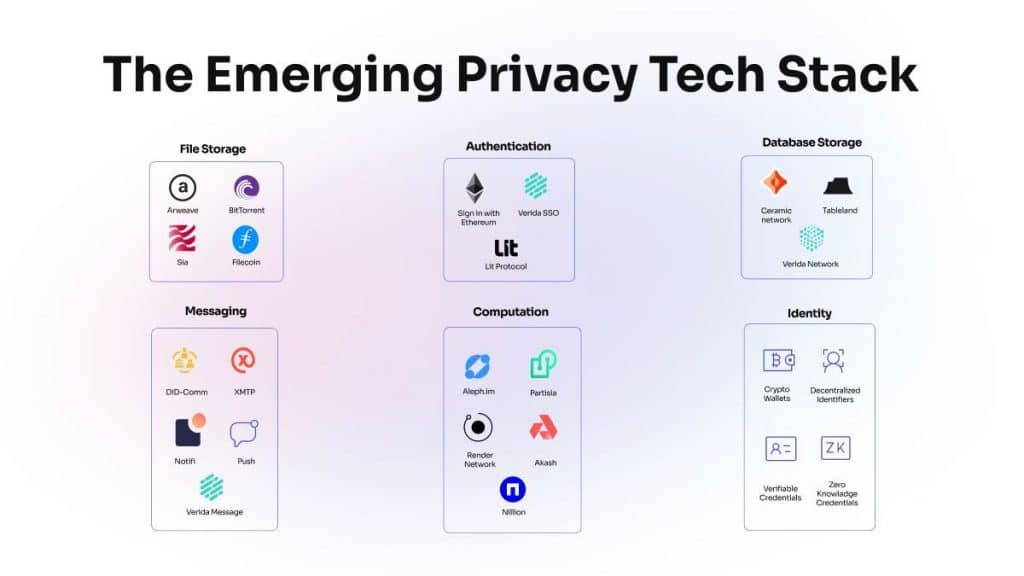Verida CEO Chris Were said that the ZK-based privacy technology stack will usher in a new era in software.

Posted: January 18, 2024 12:55 PM Updated: January 18, 2024 12:56 PM

Correction and fact check date: January 18, 2024, 12:55 p.m.
briefly
Chris Were, CEO of Verida, emphasizes the use of user control, encryption, and zero-knowledge proofs to mitigate data breaches.

Today, there is growing concern about data breaches and privacy violations in complex, centralized systems comprised of numerous components and where data is often accessible to thousands of employees. Most hacks are caused by social engineering, often targeting employees.
This has led to the introduction of a privacy technology stack in security environments, providing increased control and protection for both individuals and enterprises.
In a conversation with Metaverse Post, Verida CEO Chris Were emphasized that the privacy technology stack represents a transformative force that can usher in a new era of software development where user control, data security, and privacy are priorities.
Verida is a full-stack development framework for Web3 and a decentralized personal data network.
“Imagine a data breach on a centralized platform, such as a breach where hackers gain access to the entire system and compromise all users’ data. This is an important issue because one vulnerability exposes everyone’s information. However, in the emerging privacy technology stack, data is decentralized and resides with individual users. As a result, security breaches only affect one person, making the impact much more localized and manageable,” Chris Were told Metaverse Post.
“It is important to remember that a significant proportion of hacks occur due to password theft. Emerging privacy technology stacks are phasing out cryptography in favor of larger encryption and private keys, making them nearly impossible to crack. “This change, along with the removal of passphrases and security questions, improves the overall security and privacy of end users,” he added.
One of the core components of the privacy technology stack is decentralized identity, which leverages a private key unique to each user to ensure that a user’s personal information is protected and managed solely by the user. These changes not only put control in the hands of users, but also lay the foundation for secure and transparent digital interactions.
The role of zero-knowledge proofs in the privacy technology stack
Zero-knowledge proofs are an important pillar of our privacy technology stack, ensuring that users only share the essential information needed to access services. This technology uses cryptographic methods to reduce the risk of sensitive information exposure and enhances security by storing zero-knowledge credentials in a decentralized database.
Highlighting the impact, Chris Were said, “When we share data today, we have to share the actual information itself. For example, if I want to prove I’m over 18, I’ll probably have to share my passport or driver’s license with you, which provides a significant amount of information about me to prove my age.”
Zero-knowledge credentials, on the other hand, work differently. “It uses advanced math and allows two parties to communicate, so I can prove to a third party that I am over 18 without revealing my name or any actual information,” he added.

Another important element of the privacy technology stack is distributed databases, which have unique capabilities to mitigate cybersecurity risks compared to centralized databases. The core of their strength lies in putting control directly in the hands of users via their private keys, creating a bastion of security and privacy.
Unlike centralized databases that require implicit trust in the company, distributed systems operate on a user-centric model. In this paradigm, enterprises and applications must explicitly seek user permissions to access data to increase confidence in data privacy. This approach stands in stark contrast to the widespread problem of security breaches in centralized platforms, where a single breach can compromise all users’ data.
“We are already seeing a growing awareness among users of the vulnerabilities their data faces on the internet, including the risk of hacking and data security breaches. This increased awareness will drive users to consciously consider the products and services they engage with,” said Verida’s Chris Were.
“Security is a fascinating aspect that is often overlooked until it becomes an issue. Forward-thinking companies are investing in migrating to this new decentralized model, seizing the opportunity to gain an advantage over competitors who may face security breaches,” he added.
As applications proliferate, users are increasingly recognizing the value of controlling their data. Demand for apps that facilitate user data accessibility and utility is poised to grow.
disclaimer
In accordance with the Trust Project Guidelines, the information provided on these pages is not intended and should not be construed as legal, tax, investment, financial or any other form of advice. It is important to invest only what you can afford to lose and, when in doubt, seek independent financial advice. We recommend that you refer to the Terms of Use and help and support pages provided by the publisher or advertiser for more information. Although MetaversePost is committed to accurate and unbiased reporting, market conditions may change without notice.
About the author
Kumar is an experienced technology journalist specializing in the dynamic intersection of emerging fields including AI/ML, marketing technology, cryptocurrency, blockchain, and NFTs. With over three years of experience in the industry, Kumar has established a proven track record in crafting compelling narratives, conducting insightful interviews, and providing comprehensive insights. Kumar’s expertise lies in producing impactful content, including articles, reports and research publications for prominent industry platforms. With a unique skill at combining technical knowledge and storytelling, Kumar excels at communicating complex technical concepts in a clear and engaging way to diverse audiences.
more articles


Kumar is an experienced technology journalist specializing in the dynamic intersection of emerging fields including AI/ML, marketing technology, cryptocurrency, blockchain, and NFTs. With over three years of experience in the industry, Kumar has established a proven track record in crafting compelling narratives, conducting insightful interviews, and providing comprehensive insights. Kumar’s expertise lies in producing impactful content, including articles, reports and research publications for prominent industry platforms. With a unique skill at combining technical knowledge and storytelling, Kumar excels at communicating complex technical concepts in a clear and engaging way to diverse audiences.
